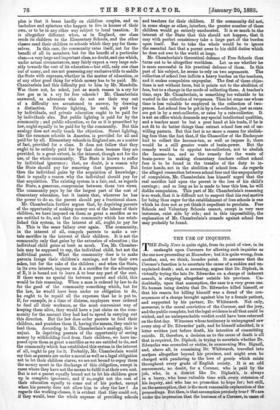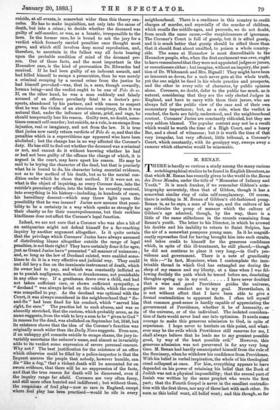THE USE OF INQUESTS.
THE Daily News is quite right, from its point of view, in its onslaught upon Coroners for allowing such inquiries as the one now proceeding at Hounslow; but it is quite wrong, from another, and, we think, broader point. It assumes that the Coroner's function is to ascertain the cause of a sudden and un- explained death.; and, so assuming, argues that Dr. Diplock, in virtually trying the late Dr. Edwardes on a charge of indecent assault, is stepping altogether outside his province. Un- doubtedly, upon that assumption, the case is a very gross one. No human being doubts that Dr. Edwardes killed himself, or that his reason for killing himself was a dread of the con- sequences of a charge brought against him by a female patient, and supported by his partner, Dr. Whitmarsh. Not only, moreover, is the moral conviction of the Coroner, and the jury, and the public complete, but the legal evidence is all that could be wished, and an unimpeachable verdict could have been returned on the first day. Witnesses whose testimony is unimpugned saw every step of Dr. Edwardes' path, and he himself admitted, in a letter written just before death, his intention of committing suicide. If, therefore, a decision as to the cause of death is all that is required, Dr. Diplock, in trying to ascertain whether Dr. Edwardes was scoundrel or victim, in summoning Mrs. Bignell, and, above all, in examining Dr. Whitmarsh, travelled into matters altogether beyond his province, and might even be charged with pandering to the love of gossip which exists throughout every grade of English society. It is an odd. amusement, no doubt, for a Coroner, who is paid by the job, who, in a district like Dr. Diplock's, is always in a hurry, who loses valuable time with every extension of his inquiry, and who has no promotion to hope for; but still, on the assumption, that is the most reasonable explanation of the proceedings. But then, is that assumption precisely true P We are under the impression that the business of a Coroner, in cases of
suicide, at all events, is somewhat wider than this theory con- cedes. He has to make inquisition, not only into the cause of death, but into a crime ; to decide whether the deceased was guilty of self-murder, or was, as a lunatic, irresponsible to the laws. In the former case, he is bound to ask the jury for a verdict which formerly carried penalties once thought most grave, and which still involves deep moral reprobation, and, therefore, to ascertain in the fullest way all facts bearing upon the probable condition of mind of the deceased per- son. One of those facts, and the most important in the Hounslow case, is the kind of provocation Dr. Edwardes had received. If he had been guilty of an indecent assault, and had killed himself to escape a prosecution, then he was merely a criminal escaping by a second crime from the justice he had himself provoked—was, that is, a sane, though cowardly, human being—and the verdict ought to be one of Fele de se. If, on the other hand, he was a man suddenly and falsely accused of an offence peculiarly fatal to a doctor's pro- spects, abandoned by his partner, and with reason to suspect that he was the victim of an atrocious conspiracy, then it was natural that, under the influence of alarm, grief, and rage, he should temporarily lose his reason. Guilty men, no doubt, some- times commit self-murder; but suicide, as a rule, is an escape from injustice, real or imaginary, and not from the law. It is true that juries now rarely return verdicts of Fele de se, and that the penalties which in a superstitious age appeared wise have been abolished ; but the change has in no way affected the Coroner's duty. He has still to find out whether the deceased was a criminal or not, and cannot do it without knowing whether he had or had not been guilty of the offence the charge of which, it is argued in the court, may have upset his reason. He may be said to be trying the character of the dead, but that is precisely what he is bound to do, his character being essential evidence, not as to the method of his death, but as to the mental con- dition under which he chose that method. If it were not so, what is the object of inquiring, as every Coroner does, into the suicide's pecuniary affairs, into the letters he recently received, into everything in his history—including, in hundreds of cases, his hereditary descent—which may throw light upon the possibility that he was insane? Juries now assume that possi- bility to be a certainty in a way which speaks as strongly for their charity as for their unscrupulousness, but their reckless kindliness does not affect the Coroner's legal function.
Indeed, we are not sure that a Coroner who was also a bit of an antiquarian might not defend himself for a far-reaching inquiry by another argument altogether. Is it quite certain that the privilege which Coroners' Juries have always assumed of distributing blame altogether outside the range of legal penalties, is not their right ? They have certainly done it for ages, just as Grand Juries have" presented " all manner of nuisances ; and, so long as the law of Deodand existed, were enabled some- times to do it in a very effective and judicial way. They could and did levy a fine on the inanimate instrument of death, which its owner had to pay, and which was constantly inflicted so as to punish negligence, malice, or drunkenness, not punishable in any other way. If a gentleman drove over a child, and had not taken sufficient care, or shown sufficient sympathy, a " deodand " was always levied on the vehicle, which the owner was compelled to pay. As the deodand was optional with the Court, it was always considered in the neighbourhood that " So- and-So " had been fined for his conduct, which " sarved him right, for sure." The practice led to such abuses, and was so absurdly stretched, that the custom, which probably arose, as its name suggests, from the wish to levy a sum to be " given to God " in masses for the dead, was abolished on September 1st, 1846, but its existence shows that the idea of the Coroner's function was originally much wider than the Daily News suggests. Even now, if an unhappy girl commits suicide to escape shame, the jury in- variably ascertains the seducer's name, and almost as invariably adds to its verdict some expression of severe personal censure. Why not The best justification for the existence of an office which otherwise could be filled by a police-inspector is that the Inquest assures the people that nobody, however humble, can die "like a dog," that a violent death will be accounted for on sworn evidence, that there will be no suppression of the facts, and that the true reason for death will be discovered, even if the inquiry range far afield. Coroners are very often fussy, and still more often hurried and indifferent ; but without them, the suspicions of foul play—now so rare in England, except where foul play has been practised—would be rife in every neighbourhood. There is a readiness in this country to credit charges of murder, and especially of the murder of children, which recalls the middle-ages, and proceeds, we do not doubt, from much the same cause,—the suspiciousness of ignorance. The Coroner's Court is full of gossip, but it is sifted gossip, and it is much better that gossip should be sifted there than that it should float about unsifted, to poison a whole country- side. The scene at Hounslow is most discreditable to the' Hounslow people, who, when the first excitement was over, ought to have remembered that they were not appointed judges or jurors, or executioners either ; but imagine, without an inquiry, the posi- tion of Dr. Whitmarsh and Mrs. Bignell ! They might have been as innocent as doves, for a mob never gets at the whole truth, yet the one might be fined in his whole practice and prospects, and the other in every relic of ,character, by public opinion alone. Coroners, no doubt, defer to the public too much, as is natural, considering that they are the only elected Judges in England, and have to carry with them their jurors, who are always full of the public view of the case and of their own momentary importance; but, as a rule, when the verdict is reached, the facts are fairly.nnderstood, and the neighbourhood content. Coroners' Juries are constantly ridiculed, but they are very seldom blamed. The popular content may not be a result which would be worth the time of a High Court, and a heavy Bar, and a cloud of witnesses ; but it is worth the time of that very irregular, but very efficient, little tribunal, a Coroner's Court, which constantly, with its gossippy way, sweeps away a rumour which otherwise would be miasmatic.



































 Previous page
Previous page